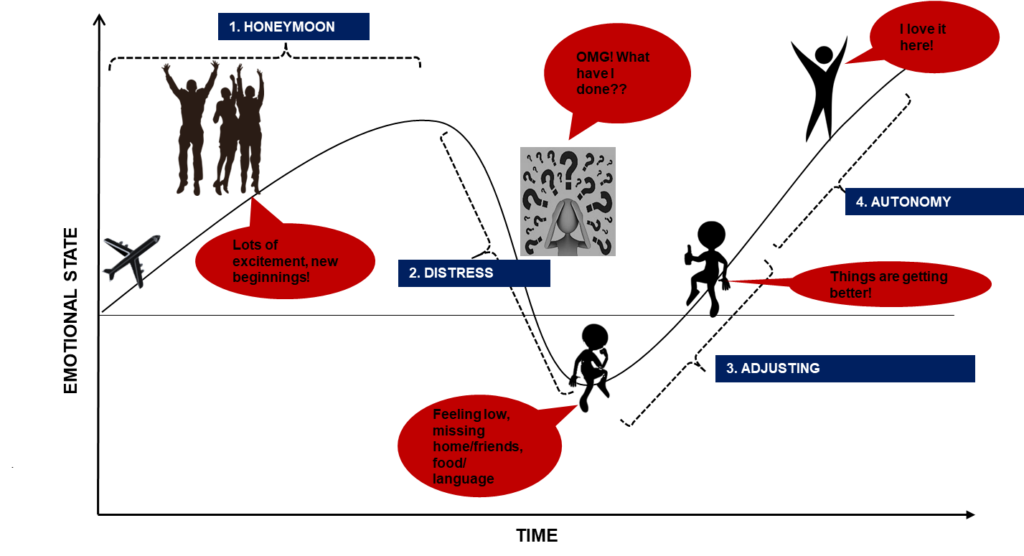No matter where you are in your study abroad journey, whether you’re still in the planning stages or you’re settling in to your student accommodation, you are likely to experience culture shock at some point. (Trust us when we say we’re speaking from experience — after all, we here at International Student Pathfinder are former international students ourselves.)
Culture shock can adversely affect many aspects of university life, from your academic performance and career prospects to your overall physical and mental health.
We know this sounds a bit scary, but there is some good news. Learning how to recognise and manage culture shock will make you a more resilient, adaptable, and mentally strong person. In some ways, culture shock is a positive learning experience — and it can even enhance your employability.
In this article, you will get a better understanding about the causes and symptoms of culture shock as well as some tried and tested tips for managing it.
What is culture shock?
Culture shock refers to the emotional and psychological reactions to an unfamiliar culture and environment.
For international students, culture shock is often uncomfortable and disorienting. Although culture shock can be a good thing in some ways, it’s important for students to understand what culture shock is, what causes it, and how to manage its effects.
Potential causes of culture shock
- Weather. The UK is a famously cold and rainy place, particularly during term time. Most international students who come from warmer climates may have a hard time adjusting. Students may find some consolation to find out that even UK natives struggle to cope with the weather.
- Language. Students whose first language is not English may get a little frustrated when communicating. Regional dialects and accents can further complicate things, even for students who are fluent in English.
- Social norms. Different cultures have different, often unspoken, cultural norms and rules which affect behaviour. For example, the British are renowned for their punctuality. Arriving late to class or work is considered a social faux pas, so ensure you’re always on time.
- Food. If British food isn’t to your liking, you may find yourself craving the familiar tastes of home. Fortunately, many UK urban centres feature international grocers and suppliers which may carry your local cuisine.
- Academic system. The UK educational system may be vastly different from what you’re used to, with different expectations, requirements, and marking procedures.
- Sounds of home. Many students also miss the sounds of their native countries when studying abroad. Research commissioned by HSBC showed that 57% of international students miss the sensory experience of their hometowns. 74% indicated that they specifically missed the sounds of their hometowns including: people speaking their native language and the hustle and bustle of local markets etc.
Symptoms of culture shock
The physical and mental effects of culture shock will vary from person to person, but often include:
- isolation
- homesickness
- irregular sleep patterns
- physical aches and pains
- frustration with various elements of the host culture
- feelings of helplessness, loneliness, depression, and anxiety
Does culture shock only affect international students?
Certain elements of culture shock, including language barriers and foreign social norms, uniquely affect international students.
However, domestic students, particularly first-years, can also experience culture shock. Like many international students, most freshers are living on their own, away from their friends and family, for the very first time.
The academic aspect of uni life also presents a significant challenge for most students. Balancing studies alongside work, extracurricular activities, and household responsibilities isn’t easy.
Remember, culture shock is an umbrella term. University life is its own subset of UK culture, and it can affect any student regardless of age or ethnicity.
The phases of culture shock
1. Honeymoon. When you first arrive in the UK, you’ll probably be very excited about starting university in a new country and eager to explore the new environment.
2. Distress. After the initial excitement wanes and the semester begins, you may find yourself feeling overwhelmed, isolated, or confused.
3. Adjustment. You’ll eventually adjust to UK culture and start to accept the differences and similarities to your own culture.
4. Autonomy. Once you’ve fully adjusted, you’ll enjoy a newfound sense of confidence and comfort. This will empower you to fully immerse yourself in UK culture and make a fresh start at uni.

Phases of Culture Shock
Dealing with culture shock
The first step in managing culture shock whilst at university is to recognise it. Once you acknowledge that you’re struggling with culture shock, you can then take steps to turn it into a learning experience.
Students manage culture shock in their own ways, and some international students may never fully adjust to living in the UK.
Remember, be patient with yourself during this process. Culture shock is difficult to manage, but the life skills you’ll earn from this experience are just one of the many benefits of studying abroad.
Tip #1: Accept that culture shock is normal.
Culture shock is a perfectly normal part of the study abroad experience. It doesn’t mean that something’s wrong with you, or that you’re incapable of adapting to your environment. Even native-born UK students deal with culture shock.
Tip #2: Keep in contact with your loved ones back home.
Make time to contact your friends and family back home regularly. Not only will they be eager to hear all about your travels, but seeing a familiar face will help relieve stress, frustration, and homesickness.
We’re lucky to live in the era of the internet, which enables us to video chat for free through a variety of apps. If your family members aren’t exactly tech-savvy, consider setting up a Skype account (or similar service) before you leave and showing them how to use it.
Tip #3: Attend your university’s orientation programmes.
Almost all UK universities offer an introductory orientation programme to help students get acquainted with their campus. These events often include campus tours, informative talks on the university’s procedures and services, and even fun events like games nights and sports sessions.
Some orientation programmes are uniquely tailored to international students to help them acclimatize to UK culture and build a support network. Check your university’s events calendar and make an effort to attend as many of these events as possible.
Tip #4: Socialise and make friends.
Apart from orientation programmes for international students, most UK universities provide clubs and societies for international students. Some international student societies arrange fun events, like trips around the UK, English language classes, social meetings, and recreational activities.
Such services are invaluable for international students keen to make new friends from all over the world. Befriend as many international students as possible — they’ll be able to empathize with your culture shock struggle and help you work through it.
Tip #5: Take good care of your mind, body, and spirit.
Sports clubs and exercise equipment are available at most UK universities, making it easy to maintain your physical and mental health. If faith is important to you, inquire about the worship services available on campus or nearby.
Tip #6: Don’t isolate yourself.
The worst thing you can do while trying to cope with culture shock is shut yourself away in your student accommodation.
Remember, you don’t have to go through this alone.
In fact, other students at your university are probably grappling with the same challenges you are, so reach out to them.
The value of friendship in times of difficulty cannot be overstated. As Hellen Keller once said: “Walking with a friend in the dark is better than walking alone in the light.”
Final thoughts on managing culture shock
Culture shock is a perfectly normal part of the study abroad experience, but it can also feel debilitating at times.
The important thing is to remember that it will pass.
After all, this phase of your life as an international student is temporary, so make the most of it!
Use the experience as an important learning opportunity, helping you to become versatile and adaptable to change. It will equip you with valuable life skills and is one of the benefits of studying abroad
Step outside your comfort zone, make new friends, and take full advantage of the once-in-a-lifetime experiences while you can. Once your study abroad experience is over, your family and friends will be ready and waiting to hear all about your adventures.
Need more advice on making the most out of your international study experience?
That’s what we’re here for.
Grab yourself a copy of the definitive guide for international students, International Student Pathfinder: The Essential Guide to UK Universities and Careers.
Useful resources and further reading on culture shock
- How to cope with stress at university
- How to cope with culture shock
- 9 tips for international students moving to the UK
- Why culture shock is good for you
- Sounds of Home – A soundscape album created by HSBC for international students who miss the sounds of their hometowns including sounds from India, Singapore, Malaysia & Taiwan.




